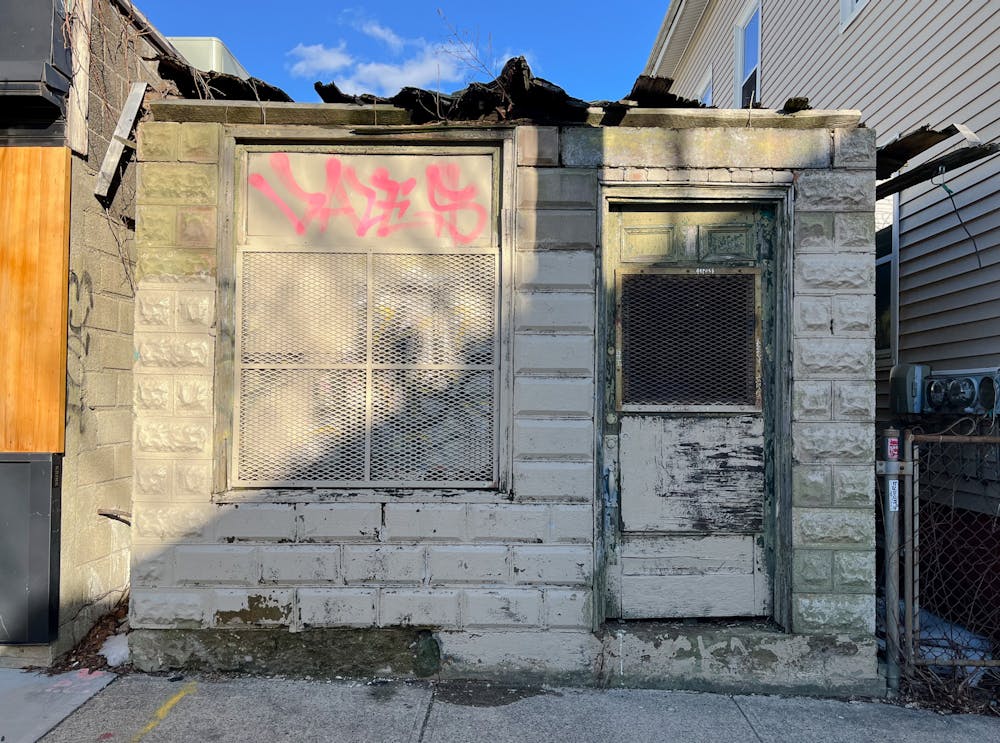Five blocks east of Thayer sits Ives Street, a calm stretch filled with a variety of small businesses and eateries. While Ives is farther from the University’s central campus, it is still known as a popular place in the community to shop and eat.
The Herald spoke to four business owners on Ives and three from the nearby Wickenden Street about changes to the area.
Peaceable Kingdom first opened on Wickenden in 1980 and moved to Ives 7 years later. The gift shop is filled with artisan-crafted jewelry, clothing and more, along with the wagging tail of the puppy-of-the-shop, Louie.
According to Owner Joan Ritchie, the biggest change to Ives Street is the new businesses coming in. “They’ve changed the setting enormously,” she said, citing an increase in walking traffic. Ritchie added that these changes are a result of gentrification, but that the process “took much longer than other streets.”
Emory Harkins, co-owner of Twenty Stories on Ives, echoed Ritchie’s sentiments, noticing an influx of new businesses. Harkins, a Providence native, opened the bookstore’s storefront in 2019. “It’s exciting to see a lot of young entrepreneurial people coming to the street,” he said.
“The street has definitely grown in popularity with the addition of some amazing places,” wrote Lori and Paul Kettelle, co-owners of PVDonuts, in an email to The Herald.
All but one of the restaurants mentioned in a 2011 Herald article on Ives have now closed. More recently, Malachi’s coffee shop, Eagle Supermarket (now Chomp) and a travel agency (now Kow Kow) have closed, wrote the Kettelles. Off of Ives, Lion Eye gift shop and Togs on Brook closed at the end of 2019 and 2021, respectively.
“We're honestly not sure why the closures happened,” wrote the Kettelles, “especially in regards to Malachi's, which was a very popular spot.”
“There’s a different flow to (Ives) street,” said Ann Dusseault, owner of Old Bag Vintage, a vintage clothing store that opened in October 2020. Dusseault previously owned Pie in the Sky on Thayer St., which closed in Fall 2020, The Herald previously reported.
On Ives, most storefronts are closed Monday and Tuesday, giving Dusseault freedom to take days off, which were very rare during her 27 years on Thayer.
Rent is less than a quarter of what she paid on Thayer, but the Fox Point neighborhood as a whole has become more expensive compared to when she first arrived, Dusseault said. Many of the places formerly on Thayer that stayed in business have moved to the West Side or Hope Street, she added, and the introduction of franchises like Shake Shack and Warby Parker has also happened in the communities around Harvard and Yale.
Owners also shared different views about the future of the street.
“I hope that it will stay small business,” Harkins said. “I think, unfortunately, there's going to be some people who come in with a lot of money … and are going to start making it more of a luxury housing market.”
Ritchie also thinks that the street will become more expensive. New development “changes the whole feeling of the community,” she said. There have also been struggles with increasing rent prices, both for businesses and residential properties, Ritchie said.
According to Harkins, the surrounding housing community has also become less accessible. “I do hope that there’s something that can be done for affordable housing in Fox Point as a whole, not just specifically on Ives Street.”
Despite changes that have occurred, there is still hope that Ives will remain largely the same. Harkins said that he does not think the street will be developed to the extent that Thayer has been for a long time.
“I don’t know if it has the capacity for that just because there’s not as many commercial storefronts,” he said. “Most of the landlords and people who own the buildings in the neighborhood are invested in the neighborhood itself and in the community more than selling out to bigger corporations.”
“I think it’s going to prosper,” Dusseault said. “It’s one of those places people will be attracted to.” She also hopes that increasing prices and commercialization don’t push out current residents.
“We think it'll continue to grow and flourish as a diverse community of residents and business owners,” especially with the development of the India Point Park waterfront area, wrote the Kettelles.
Running perpendicular to Ives is Wickenden, whose businesses share experiences with those on Ives.
“Things come and go all the time,” said Richard Kahan, owner of Red Bridge Antiques, whose storefront has been on Wickenden since 1998. “There used to be many more bars on the street, along with 12 antique shops, but numbers have dwindled, and only three antique shops remain,” he said.
Marian Clark, owner of Benefit Street Antiques, has been on Wickenden for 34 years. Because of the pandemic, “the last few years have been really scary,” Clark said.
Still, Wickenden is “a lively street,” she said. “There’s a lot going on here,” with businesses ranging from a gas station to an eyeglass place to antique shops, restaurants and florists.
The Wickenden Area Merchants Association works to support businesses and raise awareness of the street, said Vincent Scorziello, owner of Campus Fine Wines, who helps run the association. Scorziello’s store, located at the corner of Brook and Wickenden Streets, has been around for 40 years, and he has owned it for 10.
The association includes business on Wickenden and a few side streets, including Brook, Hope and Ives. They collaborate on group advertisements, events on the street and the biannual Makers and Merchants street fair. “The goal of the Merchants Association is to do what we can to improve the street and raise awareness of businesses,” Scorziello said.
The street has not changed “as much as you would think with a pandemic,” Scorziello added. Bars and other establishments that depend on in-person activities seemed to face the most difficulties, but “most of the businesses on the street seemed to weather the pandemic pretty well,” he said.
As for the street as a whole, “Hopefully it’ll keep some of its personality because I think what makes it special is the little mom-and-pop businesses and small businesses,” Kahan said. She added that Fox Point “still has some soul.”
“It’s such a niche and everybody loves it,” Clark said. “I would like it to stay like it is,” — a walking street for the neighborhood — rather than be modernized, she added.
As the area is fairly developed, a potential contributor to increasing prices is the high demand for space, Scorziello said. But a lot of the businesses he works with have been on the street for a long time and seem to have secure relationships with their landlords and stable rent, he said.
There are currently developments on both ends of Wickenden, Scorziello said. Where Wickenden turns into Point Street, the new land created by the I-95 Commission is slowly being sold off and developed.
This development is supposed to include a market — rumored to be Trader Joe’s — which could potentially bring people to the street. But, being right off the highway ramp, “I think people are just going to get off the highway, go to the Trader Joe's or whatever is there, and then hop back on the highway,” Scorziello said.
Another development supposed to be happening by the Pedestrian Bridge is mostly residential with street-level retail, which Scorziello said will be “good for foot traffic and people coming to businesses.”
Both streets and the surrounding areas continue to change, but businesses hope to preserve the atmosphere of the area. “The fun thing is when people come in, who went to school 15 years ago, and say ‘I can’t believe you’re still here,’” Kahan said.

Rhea Rasquinha is a Metro editor covering development and infrastructure. She also serves as the co-chief of illustrations. She previously covered College Hill, Fox Point and the Jewelry District. Rhea is a senior from New York studying Biomedical Engineering.





